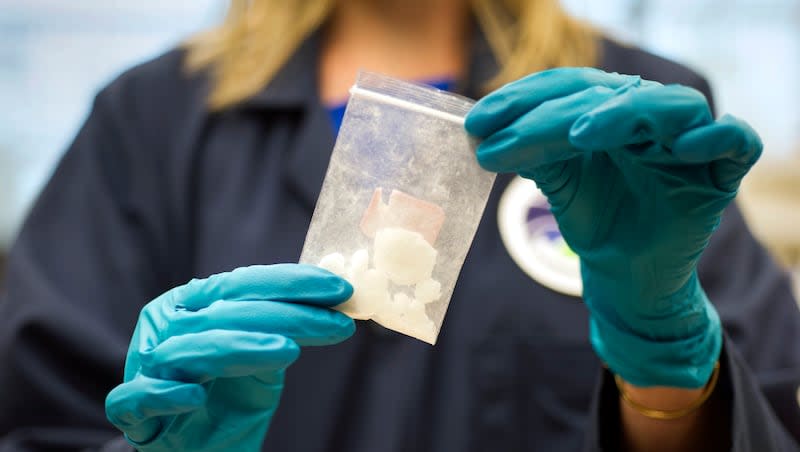As fentanyl deaths rise, Sen. Mitt Romney says ‘the question is what can we do’

- Oops!Something went wrong.Please try again later.
- Oops!Something went wrong.Please try again later.
The U.S. — and the state of Utah — has seen a disturbing uptick in fentanyl-related deaths in recent years.
“And the question is what can we do,” said Utah’s Sen. Mitt Romney, the top Republican at a hearing Wednesday held by the subcommittee on Emerging Threats and Spending Oversight, alongside Sen. Maggie Hassan, D-N.H.
According to the Centers for Disease Control and Prevention, more than 150 people die every day of an overdose related to drugs like fentanyl. In 2022, it was responsible for taking around 83,000 lives in the U.S. The federal government views it as “a deadly drug crisis.”
In her opening remarks, Hassan, chairwoman of the subcommittee, noted her trip to China last fall alongside a bipartisan congressional delegation. The New Hampshire senator said she pressed Chinese President Xi Jinping “to do more to stop the manufacturing and exploitation of fentanyl precursor chemicals.” She noted that President Joe Biden during a summit a month later asked Xi to do the same. At the time, the Chinese government showed a willingness to crack down on drug trafficking.
“I don’t believe (China) fully lived up to those commitments,” said Romney. “Has there been the same kind of concern about fentanyl in China as there is here in the U.S.? My expectation is that there has been a much tougher approach taken there.”
He also said the government of Mexico has not done what it should to fight “organized crime and the cartels,” while suggesting the new Mexican leadership could make a difference.
“Ending organized crime is something we’ve been trying to do since the 1930s or probably before that,” said Romney. T
A single piece of legislation can’t fix this multilayered problem, Romney said. Curbing demand for narcotics and fentanyl “strikes me as a very difficult task,” he said, “But that’s one possibility.”
Securing the border through monitoring systems is another option, but it’s tough to completely seal it against deadly drugs since traffickers can get individuals to smuggle the product on their person, send it through mail, or via aircrafts and ships, the GOP senator noted.
Tackling the financial system behind the trafficking is also tough because “if someone’s willing to pay you money, and someone’s willing to get paid that money, they’re going to find a way to launder it.”
He asked one of the three witnesses what lawmakers should focus on to minimize “the scourge of fentanyl.”
Celina Realuyo, professor of practice at the William J. Perry Center for Hemispheric Defense Studies, National Defense University, pointed to the biggest challenge: fentanyl’s highly addictive nature and low production cost, which is roughly 30 cents when produced in a Mexican lab, then sold for between $10 to $20 in the Washington, D.C., area. This price point has encouraged many traffickers to switch to synthetic drugs, replacing other plant-based drugs like heroin, marijuana or cocaine, which the Drug Enforcement Administration has an easier time tracking.
“We’re about to enter prom season here in the United States,” she said, noting DEA campaigns like “One Pill Can Kill” are crucial for the safety of today’s youth from deadly substances that can be bought online.
Realuyo said criminal networks have established parallel markets on the internet, promoting them through social media platforms, where young people use only emojis and numbers for transactions.
“We as parents and as educators are not watching what our kids are doing online,” said Realuyo. “Then the drug gets sent or gets physically exchanged at the parking lot or the McDonald’s next to the high school.”
When aiming to restrain supply, legislation can focus on technology platforms, like WeChat, Zelle, PayPal and Venmo, that are used to buy and sell fentanyl as well as other drugs. Traffickers also ask young people to set up cryptocurrency wallets, she added.
All of these methods fall under the cyber-physical world, allowing traffickers to circumvent law enforcement and regulation, while policies in this area could be used to reduce demand and supply, Realuyo added.

